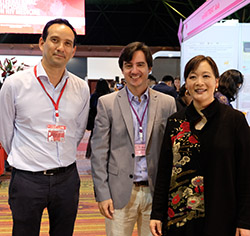In January, the HIV Netherlands Australia Thailand Research Collaboration (HIV-NAT) held its 21st annual Bangkok International Symposium on HIV Medicine. The three-day symposium was chaired by Professor Emeritus Dr. Praphan Phanuphak, director of the Thai Red Cross AIDS Research Center and director of HIV-NAT, both in Bangkok and TREAT Asia collaborating research partners. amfAR co-sponsored the event, which attracted more than 540 participants.

(Left to right) Tor Petersen, TREAT Asia; Dr. Sunee Sirivichayakul, Chulalongkorn University (Thailand); Dr. Kulkanya Chokephaibulkit, Mahidol University (Thailand); Dr. Surasith Chaithongwongwatthana, Chulalongkorn University; Ms. Somsong Teeratakulpisarn, Chulalongkorn University; Dr. Thida Chanyachukul, TREAT Asia
The symposium provided health care workers and people living with and affected by HIV with in-depth reviews of HIV management, current efforts to improve access to therapy, and updates on new research into HIV treatments and vaccines. Experts in the field from around the world discussed multiple topics, including HIV care and prevention for adolescents, treatment access and optimization, and coinfections. Skills-building workshops were held on specific issues, including HIV treatment failure and biostatistics, chaired by TREAT Asia network investigators Dr. Evy Yunihastuti of the University of Indonesia; Dr. Matthew Law of the Kirby Institute, University of New South Wales, Sydney, Australia; and Dr. Stephen Kerr of HIV-NAT.
“In its 21st year, the Bangkok International Symposium on HIV Medicine is as relevant as ever,” said Dr. Nittaya Phanuphak of the Thai Red Cross AIDS Research Centre and a TREAT Asia network investigator. “This year’s event featured leading HIV physicians and researchers from the region and around the world. Their superb talks, tailored to the Asia Pacific, tackled the many pressing and nuanced issues that still make effectively addressing the HIV epidemic a challenge.”
Program Highlights
 Dr. Jeremy Ross, TREAT Asia; Dr. Tim Cressey, PHPT/IRD Research Unit, Faculty of Associated Medical Sciences, Chiang Mai University (Thailand); Dr. Annette Sohn, TREAT AsiaDr. Peter Reiss of the Academic Medical Center and Amsterdam Institute of Global Health and Development in Amsterdam, The Netherlands, delivered the inaugural David Cooper Memorial Lecture on “Antiretroviral therapy: Advances and impact,” and Dr. Andrew Hill of the University of Liverpool, UK, delivered the Professor Joep Lange and Ms. Jacqueline van Tongeren Memorial Lecture, titled “How close are we to treatment for all?”
Dr. Jeremy Ross, TREAT Asia; Dr. Tim Cressey, PHPT/IRD Research Unit, Faculty of Associated Medical Sciences, Chiang Mai University (Thailand); Dr. Annette Sohn, TREAT AsiaDr. Peter Reiss of the Academic Medical Center and Amsterdam Institute of Global Health and Development in Amsterdam, The Netherlands, delivered the inaugural David Cooper Memorial Lecture on “Antiretroviral therapy: Advances and impact,” and Dr. Andrew Hill of the University of Liverpool, UK, delivered the Professor Joep Lange and Ms. Jacqueline van Tongeren Memorial Lecture, titled “How close are we to treatment for all?”
Dr. Jintanat Ananworanich of the US Military HIV Research Program in Maryland, USA, moderated a debate on whether everyone in Southeast Asia should be screened and treated for latent tuberculosis. Dr. Anchalee Avihingsanon of HIV-NAT and the Thai Red Cross AIDS Research Centre, and Dr. Frank Cobelens of the Amsterdam Institute of Global Health and Development, argued in favor of the proposal; Dr. Evy Yunihastuti and current International AIDS Society president Dr. Anton Pozniak of Chelsea & Westminster Hospital, London, UK, argued against it.
A panel discussion on how to implement and scale up pre-exposure prophylaxis (PrEP), led by amfAR Program Advisory Council member Dr. Kenneth Mayer, featured Dr. Andrew Grulich of the Kirby Institute; Dr. Anton Pozniak; and Dr. Nittaya Phanuphak. The panelists described the history, current situation, and challenges of implementing PrEP, and stressed the importance of persistence, political action, and community involvement to achieve scale-up of the intervention.
In a presentation on optimizing the HIV cascade, Matthew Avery of FHI 360 LINKAGES in Bangkok, Thailand, discussed promising innovations aimed at retaining members of key populations in care throughout the phases of outreach, prevention, and treatment.